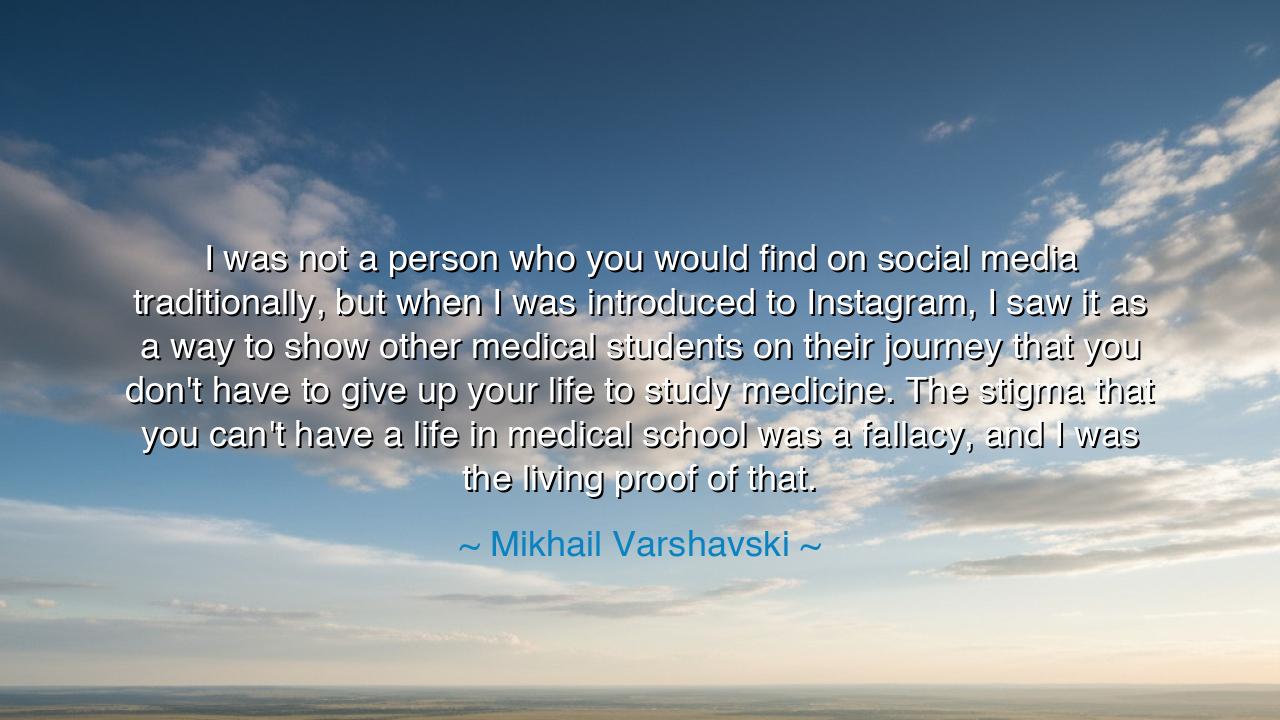
I was not a person who you would find on social media
I was not a person who you would find on social media traditionally, but when I was introduced to Instagram, I saw it as a way to show other medical students on their journey that you don't have to give up your life to study medicine. The stigma that you can't have a life in medical school was a fallacy, and I was the living proof of that.






Hear, O seekers of balance and wisdom, the words of Mikhail Varshavski, who declared: “I was not a person who you would find on social media traditionally, but when I was introduced to Instagram, I saw it as a way to show other medical students on their journey that you don’t have to give up your life to study medicine. The stigma that you can’t have a life in medical school was a fallacy, and I was the living proof of that.” In this reflection lies the voice of one who has walked the path of duty and yet refused to surrender his humanity to it. Dr. Varshavski, known to the world as “Doctor Mike,” speaks not merely of medicine, but of harmony—the ancient balance between ambition and joy, labor and living.
Since the earliest days of human endeavor, those who dedicate their lives to knowledge or mastery have often been told they must sacrifice all else. The scholar buries himself in books until his eyes dim; the healer forgets his own needs while tending to others; the artist isolates himself to chase perfection. Yet in doing so, they risk the very vitality that gives their work meaning. Varshavski’s revelation is a rejection of this false dichotomy. He declares that excellence need not come at the cost of existence, that a healer can study deeply and still laugh, love, and live fully.
In ancient times, the philosophers of Greece spoke of sophrosyne—the virtue of balance, moderation, and self-knowledge. To live wisely, they said, is to keep all aspects of life in harmony: the mind sharp, the body strong, and the soul content. Dr. Varshavski’s insight is a modern embodiment of this timeless wisdom. Through his presence on social media, a tool often dismissed as superficial, he found a way to humanize the healer, showing that to study medicine is not to abandon the self, but to integrate it into the calling. Thus, technology—so often blamed for vanity—became, in his hands, an instrument of inspiration.
Consider the example of Hippocrates, the father of medicine, who taught that “life is short, the art long, opportunity fleeting.” Even in his wisdom, Hippocrates did not demand that his students forsake all pleasures, but urged them to live in a way that sustained both body and spirit. He knew that a physician who forgets to live ceases to understand life itself—and thus loses touch with the very humanity he seeks to heal. In this same spirit, Varshavski’s choice to share his journey publicly is an act of service disguised as self-expression. By showing joy amid discipline, he restores the human face to the often merciless mask of modern medicine.
There is also courage in his words—the courage to defy the stigma of tradition. In every field, there are those who believe that struggle must be accompanied by suffering, that dignity is born only from deprivation. But history teaches otherwise. The Renaissance masters painted beauty not because they starved, but because they lived richly in art and thought. The samurai of Japan practiced not only war but poetry, tea, and meditation, believing that mastery of one craft requires appreciation of all. So too must the doctor, the student, the worker in any domain, remember that their craft is nourished by the fullness of living.
The lesson is thus luminous: discipline without delight is a hollow virtue. To deny oneself all joy in pursuit of greatness is to build a temple with no light within. Dr. Varshavski’s example teaches that excellence arises not from the denial of life, but from its embrace. The modern world often glorifies exhaustion as proof of commitment, yet true strength lies in renewal, in laughter, in human connection. The one who rests, loves, and learns with balance becomes more capable—not less.
Practical wisdom flows from this truth. Whatever path you walk—be it medicine, art, or study—remember that you serve the world best when you are whole. Let your labor be noble, but your spirit unbroken. Use the tools of your time, even those dismissed by others, to uplift and inspire. Share your journey not for praise, but for purpose. For when your light shines freely, it illuminates the path for others still wandering in shadow.
O seeker of meaning, let these words of Mikhail Varshavski guide you: you need not lose yourself to become great. To balance work and life is not indulgence—it is wisdom. To share your joy is not vanity—it is healing. And to live fully while serving others is the truest form of mastery, for the healer who embraces life gives life to all.






AAdministratorAdministrator
Welcome, honored guests. Please leave a comment, we will respond soon